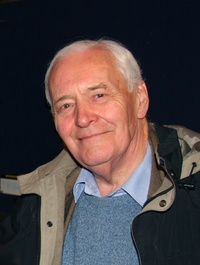
Tony Benn
Actor
Westminster, London, England, UK
Anthony Neil Wedgwood Benn (3 April 1925 – 14 March 2014), originally known as Anthony Wedgwood Benn, but later as Tony Benn, was a British politician, writer, and diarist. He was a Member of Parliament (MP) for 47 years between the 1950 and 2001 general elections and a Cabinet minister in the Labour governments of Harold Wilson and James Callaghan in the 1960s and 1970s. Originally a moderate, he was identified as being on the party's hard left from the early 1980s, and was widely seen as a key proponent of democratic socialism within the party. Benn inherited a peerage on his father's death (as 2nd Viscount Stansgate), which prevented his continuing as an MP. He fought to remain in the House of Commons, and then campaigned for the ability to renounce the title, a campaign which succeeded with the Peerage Act 1963. He was an active member of the Fabian Society and was its Chairman from 1964 until 1965. In the Labour Government of 1964–70 he served first as Postmaster General, where he oversaw the opening of the Post Office Tower, and later as a "technocratic" Minister of Technology. He served as Chairman of the Labour Party in 1971–72 while in opposition, and in the Labour Government of 1974–1979, he returned to the Cabinet, initially as Secretary of State for Industry, before being made Secretary of State for Energy, retaining his post when James Callaghan replaced Wilson as Prime Minister. When the Labour Party was again in opposition through the 1980s, he emerged as a prominent figure on its left wing and the term "Bennite" came into currency as someone associated with radical left-wing politics. He unsuccessfully challenged Neil Kinnock for the Labour leadership in 1988. Benn was described as "one of the few UK politicians to have become more left-wing after holding ministerial office". After leaving Parliament, Benn was President of the Stop the War Coalition from 2001 until his death in 2014.
Anthony Neil Wedgwood Benn (3 April 1925 – 14 March 2014), originally known as Anthony Wedgwood Benn, but later as Tony Benn, was a British politician, writer, and diarist. He was a Member of Parliament (MP) for 47 years between the 1950 and 2001 general elections and a Cabinet minister in the Labour governments of Harold Wilson and James Callaghan in the 1960s and 1970s. Originally a moderate, he was identified as being on the party's hard left from the early 1980s, and was widely seen as a key proponent of democratic socialism within the party.
Benn inherited a peerage on his father's death (as 2nd Viscount Stansgate), which prevented his continuing as an MP. He fought to remain in the House of Commons, and then campaigned for the ability to renounce the title, a campaign which succeeded with the Peerage Act 1963. He was an active member of the Fabian Society and was its Chairman from 1964 until 1965. In the Labour Government of 1964–70 he served first as Postmaster General, where he oversaw the opening of the Post Office Tower, and later as a "technocratic" Minister of Technology.
He served as Chairman of the Labour Party in 1971–72 while in opposition, and in the Labour Government of 1974–1979, he returned to the Cabinet, initially as Secretary of State for Industry, before being made Secretary of State for Energy, retaining his post when James Callaghan replaced Wilson as Prime Minister. When the Labour Party was again in opposition through the 1980s, he emerged as a prominent figure on its left wing and the term "Bennite" came into currency as someone associated with radical left-wing politics. He unsuccessfully challenged Neil Kinnock for the Labour leadership in 1988.
Benn was described as "one of the few UK politicians to have become more left-wing after holding ministerial office". After leaving Parliament, Benn was President of the Stop the War Coalition from 2001 until his death in 2014.